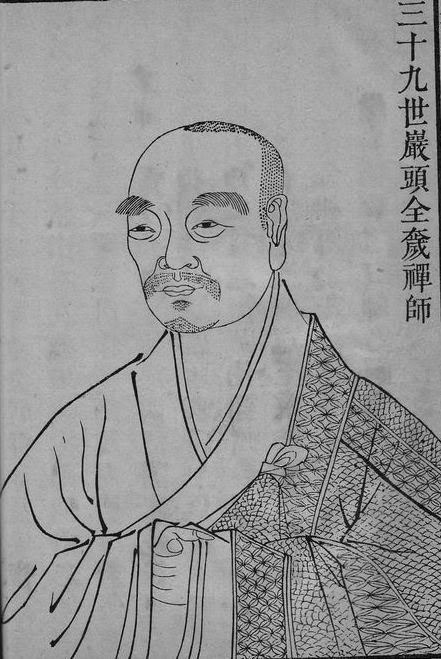ZEN IRODALOM ZEN LITERATURE
« Zen főoldal
« vissza a Terebess Online nyitólapjára

巖頭全豁 Yantou Quanhuo (828-887)
Tartalom |
Contents |
| Jen-tou Csüan-huo mondásaiból Fordította: Terebess Gábor |
Outstanding masters in the Lineage of Shih-t'ou: Yen-t'ou Disciples of Yantou Quanhuo |
Outstanding masters in the Lineage of Shih-t'ou: Yen-t'ou
by John C. H. Wu
In: The Golden Age of Zen
Taipei : The National War College in co-operation with The Committee on the Compilation of the Chinese Library, 1967, pp. 147-149.
Te-shan had only a few disciples, of whom two stood out: Yen-t'ou Ch'üan-huo (828-887) and Hsüeh-feng I-ts'un (822-908). In spiritual gifts, Yen-t'ou was superior to Hsüeh-feng. Yen-t'ou's mind was sharp as a razor. He never deferred to anyone, not even Te-shan and T'ung-shan. One day, as he came to see Te-shan, no sooner had he stepped into the door than he asked, “Is it holy or profane?” As Te-shan shouted, Yen-t'ou did obeisance. Later, when someone related the incident to T'ung-shan, the latter remarked, “Anyone else than Yen-t'ou would have found it hard to respond so well.” When Yen-t'ou heard of this compliment, he said, “The old man of T'ung-shan is very insensible to have passed such an erroneous judgment. He does not know that on that particular occasion, in acting the way I did, I was uplifting him (Te-shan) by one hand while pinching him by the other hand.”
In asking, “Is it holy or profane?” Yen-t'ou was, of course, referring to that state in which there is no more distinction between the holy and profane. In shouting at the question, Teshan made him understand that he saw eye-to-eye with him. In doing obeisance, he was on the one hand showing his delight at the master's reaction, but on the other hand he was testing how he would react. But poor Te-shan sat like an idol and accepted unsuspectingly a homage which was meant for the merely “holy”!
Yen-t'ou's radical transcendentalism finds an illustration in another episode. As he was chatting with his friends Hsüeh-feng and Ch'in-shan, Hsüeh-feng suddenly pointed at a basin filled with plain water. Ch'in-shan remarked, “When the water is clear, the moon appears.” Hsüeh-feng said, “When the water is clear, the moon disappears.” Yen-t'ou said nothing, but, kicking off the basin, went away.
In this episode, it is clear that Ch'in-shan's approach is positive, while Hsüeh-feng's is negative. But what is the big idea of kicking off the bowl? Probably, Yen-t'ou wished by his act to indicate the need of transcending both the positive and negative. Yen-t'ou often spoke of the “last word,” which, in his view, few Zen masters understood. Can it be that his kicking in this case is the last word? Anyway, he very seldom if ever allowed another to say the last word.
Disciples of Yantou Quanhuo
compiled by Satyavayu of Touching Earth Sangha
DOC: Treasury of the Forest of Ancestors
Master Luoshan Daoxian came from the city of Xiapu in the eastern coastal province of Fujian. After ordaining as a monk, he traveled widely and studied with many teachers, most prominately with Master Shishuang Qingzhu, the disciple of Daowu Yuanzhi, and with MasterYantou Quanhuo. (Master Yantou was the disciple of Master Deshan Xuanjian and a close friend and important early mentor to Master Xuefeng Yicun). Daoxian eventually settled and taught on Luo Mountain in his home region.
Once, when visiting Master Shishuang, Daoxian asked the master, “When one can't find a place
to go or a place to stay, then what?”
Master Shishuang said, “Give it up completely.”
Daoxian didn't fully understand this answer, and eventually continued his travels. When he arrived at the monastery of Master Yantou, he asked the same question.
Master Yantou said, “Going or staying – of what use is it?”
Upon hearing these words Daoxian had a great realization.
Master Ruiyan Shiyan also came from Fujian Province. He studied first with Master Jiashan Shanhui, before becoming a student of Master Yantou Quanhuo.
When first meeting Master Yantou, Shiyan asked, “What is the fundamental, constant principle?”
Yantou said, “Moving.”
Shiyan asked further, “What happens in 'moving'?”
The master said, “There's no fundamental, constant principle.”
Shiyan sank into thought.
The master then said, “If you agree, then you're bound by subject and object. If you disagree, then you fall into endless birth and death..”
With these words, Shiyan had a deep understanding.
Later, Shiyan settled and taught at Auspicious Cliff (Ruiyan) in Tanzhou, Hunan. He was known to often sit outside on a large rock, and could sometimes be heard calling out to himself, “Master!” and then responding to himself, “What?” Then he would continue,
“Stay alert!”
“Yes!”
“Never be deceived by others!'
“Okay!”
Jen-tou Csüan-huo összegyűjtött mondásaiból
Fordította: Terebess Gábor
Vö.: Folyik a híd, Officina Nova, Budapest, 1990, 99. oldal
Tarnóczy Zoltán illusztrációja
Ven-szuj [Csin-san Ven-szuj, ?-841?], Hszüe-feng és Jen-tou együtt üldögéltek.
Ven-szuj rámutatott egy tál vízre, és így szólt:
– A hold megjelenik a tiszta vízben.
– A hold nem jelenik meg a tiszta vízben – mondott ellent Hszüe-feng.
Jen-tou felrúgta a tálat.